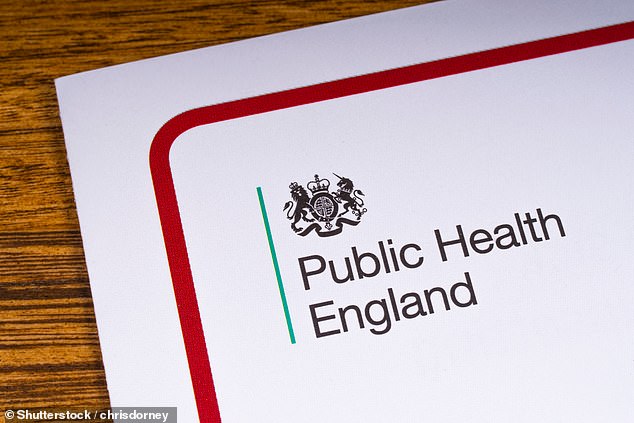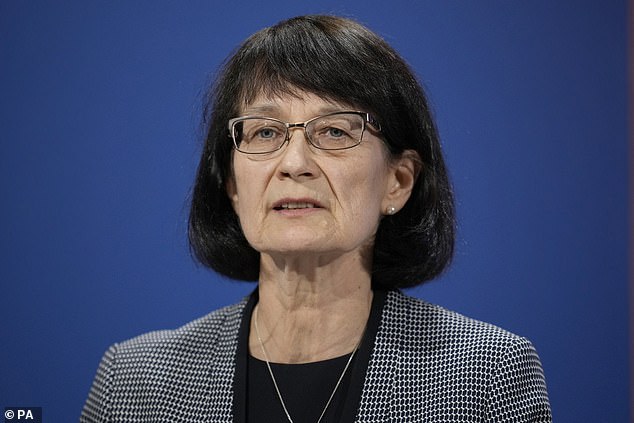Public Health England will be formally disbanded today just eight years after it was set up.
The agency is being axed following widespread criticism of its handling of the Covid crisis, which Boris Johnson slammed as ‘sluggish’ last year.
Its interim chief executive Michael Brodie said it had been a ‘unique honour’ to be at the helm during the pandemic, but admitted it was ‘relentless’.
PHE is being replaced by two new bodies — the UK Health Security Agency and the Office for Health Promotion.
The former will plan and respond to pandemics and biochemical attacks, while the latter will tackle public health problems like obesity and mental health.
PHE was slammed for its Covid response last year, in particular its handling of community testing and tracing and methods of counting deaths.
Ministers blamed the body for pausing community testing and contact tracing last March at a pivotal point in the nation’s outbreak.
Some top experts and doctors have defended PHE and accused the Government of scapegoating the agency for its own failings.
In a lengthy Twitter thread last night, interim CEO Mr Brodie said PHE staff had ‘given every ounce of everything they have in response to the pandemic’.
Alluding to the idea the agency had been used as a scapegoat, he added: ‘I am certain that with the passage of time, the contribution PHE colleagues have made will be celebrated as it should be.’

Public Health England will be formally disbanded today more than eight years after it was set up

Its interim chief executive Michael Brodie said it had been a ‘unique honour’ to be at the helm during the pandemic, but admitted it was ‘relentless’

PHE is being replaced by two new bodies — the UK Health Security Agency and the Office for Health Promotion. Dr Jenny Harries , a former regional director at PHE and deputy chief medical officer for England, has been put at the helm of UKHSA
PHE was formed in April 2013 and brought together more than 5,000 experts from more than 70 organisations into a single public service.
It was tasked with making people healthier and reducing the number of patients needing NHS care.
Mr Brodie hailed the agency for its work on the Ebola outbreak in 2014, Novichok nerve agent poisoning in 2018 and the Covid pandemic.
WHO IS REPLACING PHE?
PHE is being replaced by two new bodies — the UK Health Security Agency and the Office for Health Promotion.
The OHP will tackle the root causes of ill health, including obesity, smoking and poor mental health.
Boris Johnson said it will help Britons to ‘lead healthy lives’.
The agency will take over the arm of PHE that was responsible for public health campaigns – including putting up posters telling Britons to stop smoking.
PHE’s pandemic response duties have now been merged with the NHS Test and Trace scheme to form the UK Health Security Agency.
Its job will be to plan and respond to viral disease outbreaks including Covid and other external threats to health including nerve agent attacks.
Dr Jenny Harries, a former regional director at PHE and deputy chief medical officer for England, has been put at the helm.
Advertisement
He tweeted last night: ‘Tomorrow we place the final full stop at the end of the Public Health England story.
‘Nearly ten years in the making it has been a fascinating tale, punctuated by a number of defining chapters such as Ebola, Novichok, sugar reduction and of course the pandemic.
‘I have had the unique honour, privilege and profound responsibility of leading PHE through its final year and through to the transition to the new public health landscape.
‘It has been as rewarding as it has been challenging and as enjoyable as it has been relentless. But I wouldn’t have changed it for the world.
‘The opportunity to work with and support our incredible and selfless scientists and technical experts and watch first hand as they have given every ounce of everything they have in response to the pandemic, has been inspiring.’
Boris Johnson slammed the UK’s Covid response as ‘sluggish’ last year, in what was widely accepted as a dig at PHE.
The agency was blamed for pausing community testing and contact tracing at the start of the pandemic.
In August 2020 thousands of Covid deaths were wiped from the UK’s toll after it emerged PHE was using flawed counting methods.
It meant that anyone who died after ever testing positive for Covid was classed as a virus death, even if they were hit by a bus months later.
The following month PHE caught flack after a technical glitch saw nearly 16,000 Covid cases go unreported in England.
The technical error was caused by some Microsoft Excel data files exceeding the maximum size.
It meant that although those who tested positive were told about their results, their close contacts were not traced.
PHE’s pandemic response duties have now been merged with the NHS Test and Trace scheme to form the UK Health Security Agency.
Its job will be to plan and respond to viral disease outbreaks including Covid and other external threats to health including nerve agent attacks.
Dr Jenny Harries, a former regional director at PHE and deputy chief medical officer for England, has been put at the helm.
Dr Harries has been advising the Government throughout the current pandemic and oversaw the UK’s response to the Russian novichok poisonings in 2018.
She too was embroiled in controversy after defending the decision to scrap testing and contact tracing last March.
PHE’s health improvement work, which includes tackling obesity and cutting down on smoking, will be passed to the new Office for Health Promotion.
Announcing the new agency, Mr Johnson said in spring: ‘The new Office for Health Promotion will be crucial in tackling the causes, not just the symptoms, of poor health and improving prevention of illnesses and disease.
‘Covid has demonstrated the importance of physical health in our ability to tackle such illnesses, and we must continue to help people to lead healthy lives so that we can all better prevent and fight illnesses.’
WHAT HAS PUBLIC HEALTH ENGLAND COME UNDER FIRE FOR DURING COVID?
Public Health England has been in the firing line for a number of decisions taken during the Covid pandemic.
STOPPING TEST & TRACE
When the first cases of coronavirus appeared in the UK, Government policy was to test everyone who had symptoms after returning from abroad and to trace people they had come into contact with.
However, on March 12, testing and contact tracing stopped completely.
PHE no longer had the capacity to test the amount of people who were coming into the country infected with the virus after trips to Italy and France in half-term.
The decision has since been branded disastrous and a contributing factor to the UK’s devastating outbreak.
DEATH COUNT FIASCO
Thousands of coronavirus deaths were wiped from the government’s official count in August 2020 after questions were raised about PHE’s counting method.
Academics found PHE was counting victims as anyone who died after ever testing positive for Covid — even if they were hit by a bus after beating the disease months later.
It would’ve meant that, technically, no-one could ever recover from the virus and all would have eventually had their deaths attributed to Covid.
The agency eventually narrowed its criteria so that only people who die within 28 days of testing positive are counted.
It wiped more than 5,000 deaths from the official tally after making the change.
EXCEL BUNGLE SAW THOUSANDS OF CASES MISSED
A technical error led to nearly 16,000 cases being lost in government systems last autumn.
The bungle was caused by some Microsoft Excel data files exceeding the maximum size when they were transferred from NHS Test and Trace to PHE.
It meant that although those who tested positive were told about their results, their close contacts were not traced.
In total 15,841 cases between September 25 and October 2 were missing from the UK’s daily tallies.
‘THEY WERE OVER-CONTROLLING’
Conservative MP David Davis told MailOnline that Public Health England had been over-controlling and made a mess of coronavirus testing.
The Tory MP said: ‘They made a complete mess of the testing arrangements; they were over-centralised, over-controlling and massively reduced our ability to test.’
He warned the decision – criticised heavily by top scientists at the time – then ‘handicapped’ later decisions and was ‘precisely the wrong thing to do’.
‘Before the winter crisis, the government has to reorganise this, whether that’s abolition or taking some of the powers away from them and giving them to someone else,’ he added.
OVERLOOKING LOCAL AUTHORITIES
Public Health England kept too much power over testing and contact tracing and should have delegated it to local authorities, one expert said.
Professor John Ashton, a former public health director, said Britain should have followed the example of Cuba where local teams went from house to house screening people for coronavirus.
He said: ‘The local public health level has been neglected. I think we’ve missed an opportunity because we should have made more use of primary care, local government and volunteers…
‘Instead what we did was a very top-down, London-centric approach.’
Advertisement
Source link : https://www.dailymail.co.uk/news/article-10044637/Death-Public-Health-England-Beleaguered-agency-officially-axed-eight-years.html











